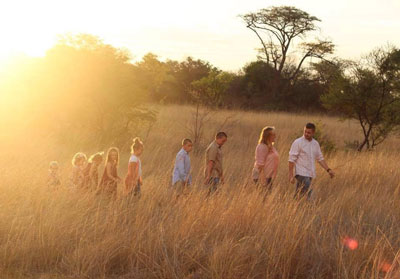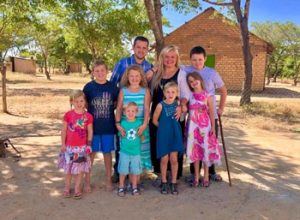How significant is the Lottie Moon Christmas Offering® to an IMB missionary? Kentucky native and IMB missionary to Zimbabwe Nick Moore explains it well.
“It’s everything — from the car we drive, to the house we live in, to the salary we make, our insurance,” said Moore, who along with his wife Kyndra and their seven children returned to Kentucky in June and will return to Zimbabwe in January. “We’ve had at least three sets of stitches, a couple of broken arms, a concussion — numerous trips to the hospitals.

“We’ve had to do emergency food runs. The economy has gotten to the point where it’s actually cheaper for us to go to South Africa or Botswana to get our groceries and our fuel. There’s a huge fuel shortage in Zimbabwe, so we have to get fuel from other parts of the world.”
That’s on the personal side. Lottie Moon giving is crucial from the ministry standpoint. “We’re in a development project right now,” Moore said. “But we are in the very early stages … we’re having to put a lot into the project and a lot into the ministry, praying that one day it will become self-sufficient.”
To grasp the ministry situation there, it’s necessary to understand the economic environment.
The downward spiral that started in the early 2000s hit a fever pitch around 2008 when the Zimbabwe dollar inflation “went through the roof,” Moore noted.
“It was dire — almost like the depression. You had people bringing in wheelbarrow loads of money to buy a loaf of bread. Or you’d order a meal and you paid before you ate it because if you waited until after that, the price would have gone up. That’s how bad it had gotten.”
That prompted a switch from the Zimbabwe dollar to the U.S. dollar. “Over the last 10 years that U.S. dollar supply has basically dried up completely,” Moore said. “In 2016 they introduced a pseudo-currency called a bond note, with the promise it was just a note that would serve as a surrogate for the U.S. dollar.”
The government said it was backed by U.S. dollars but it was not going to become its own currency.
“We saw the handwriting on the wall and basically the handwriting has come to fruition. About two months ago they announced that it’s now a new currency and that the U.S. dollar is not only not accepted, but it’s illegal to use it in the country. So they’re back on their own currency and the inflation is going through the roof.”
For example, two liters of oil now costs more than 40 U.S. dollars. Gasoline is over $15 a gallon. And as inflation goes up, people’s salaries are diminishing.
“A typical worker is still getting paid about 150 Zimbabwe dollars a month, but the inflation rate is so high, they’re making the equivalent of about 15 U.S. dollars a month, which isn’t even enough to buy the liter of gas,” observed Moore. “That’s what they’re trying to survive.”
So the obvious question looms: How do you minister in that environment?
Two words from Moore: Lottie Moon!
“That’s what I tell people when we go to our churches — that we don’t feel the desperation that our Zimbabwean brothers and sisters feel because we have a huge safety net. And that is Lottie Moon and the Cooperative Program. We go with the assurance that our bills are going to be paid and we’re going to have money that we need.”
As missionaries engage people who have desperate needs, they view it from the standpoint of development. Oddly enough, development is hindered by good intentions — an overabundance of relief aid. “Even the African economists are saying that it’s destroying our continent because when you bring in a bunch of free stuff and give it out, there’s no incentive for the local economy to thrive.”
Moore explains, “There’s a place in our town where Goodwill will just dump clothes and you can get a shirt for 50 cents and a pair of shoes for a couple of dollars. How is a local shirt manufacturer going to compete with that? How’s the local shoe manufacturer going to compete with that? They can’t. Many are saying aid is actually hurting more than it’s helping.
“What we’re trying to do is help build the local economy through agricultural development. Our main job is at the Baptist seminary, so we are training pastors. But we recognize that the pastors we train are not going to be able to make a living as pastors. They’re going to have to have some other skill set to provide for their families once they get out into the world. While we’re building this agricultural development, we’re also training the pastors in those skills – they’re leaving with a Bible in one hand and a plow in the other.
Missionary calling
Short-term involvement in missions played a role in Moore understanding the call to full-time missionary service.
“I started by going on short term trips to help train pastors. And through those short term trips I felt like God was calling us to go full-time and work at the seminary. And so we applied with IMB, and IMB sent us to work at the seminary.”
One of the biggest factors in that decision came when he looked at a chart that showed the lines of work of seminary graduates.
“That chart showed 60-plus percent were in some sort of pastoral ministry. Somewhere in the teens were those in some sort of higher education. Five percent were no longer in ministry, and 4 percent were working overseas. If there are more of our Zimbabwe seminary graduates who are out of ministry altogether than working overseas, we’ve got a problem.
“I looked at what I was doing as a pastor and I thought there’s 60 plus percent of graduates who can do what I’m doing, who want to do what I’m doing here. And yet I’m willing to go to be part of that 4 percent. And that was one of the main dominoes that fell to make me realize it’s time for me to get over there.”
Vision for Zimbabwe
Statistics support the Moore family’s commitment to Zimbabwe. “The vision that took us there was because of the need for qualified and trained leaders in Sub-Saharan Africa.
“Statistics show that by 2050, almost 40 percent of the world’s Christians will be Sub-Saharan African. That’s the way the population and the shift of evangelicalism is going. So the question is: what kind of evangelicalism, what kind of Christianity is that going to be? At the moment it’s largely a charismatic, neo-pentecostal, faith healing, prosperity gospel brand of Christianity. We recognize that. The only way to really shape the future of the church is to begin shaping the future leaders so that they are equipped to rightly handle the Word of truth.”
Seminary growth
The Baptist Theological Seminary in Zimbabwe was in severe decline in the mid 1990s. “Infrastructures were collapsing and leadership was not prepared for the challenges they were facing. There was a debt of almost $100,000 and the student body had dwindled to almost nothing.”
Moore has been in Zimbabwe since 2015, and the seminary is on a solid recovery path. “We’re now back up to about 60 students. We’ve brought on several faculty and the administration is on a more solid footing.”

Nick and Kyndra Moore and their children — Jake, Jimi, Libby, Sophia, Kate, Juliette and Johnny — serve on the mission field in Zimbabwe. Nick is a native of the Ashland, Ky., area.
Family circle
The adjustment to live in Zimbabwe versus life in America has gone well for the Moore family.
“All of [our children] at different points so far have expressed how they miss Zimbabwe and want to go back to Zimbabwe,” Moore said.
“That tells us that it’s kind of become a home for them. It’s been difficult. We’ve had our share of illness and injuries and I think the kids have missed being with their friends and family here, but they do sense the purpose for why we are there. And they get to see and be part of things that are really a privilege to be involved in with these rural African ministries and be amongst the huts and the villages and to learn life lessons about what really matters and being grateful.”

